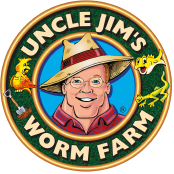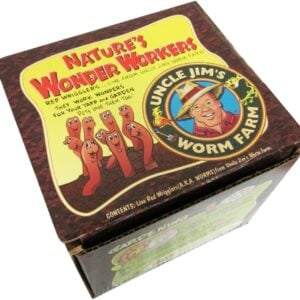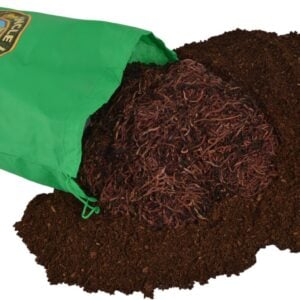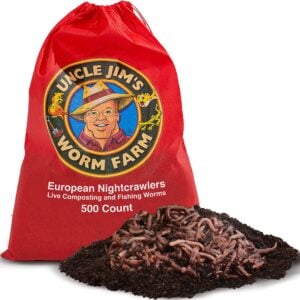
Whether it is about raising composting worms like Red Wigglers, scientifically known as Eisenia Foetida, to sell for a profit, mastering techniques for harvesting new worm cocoons (vermipods) and worm castings from either nightcrawlers or tiger worms, or breeding other worm species like Alabama Jumpers, Uncle Jim’s worm farm has the answers!
Keeping worms at home is an excellent way to recycle food scraps. Food scraps become worm food, reducing the amount of trash in landfills, including vegetable scraps, citrus fruit, and egg shells.
Our team provides worm packages that include worm feed, bedding, manuals, and instructions – everything you need to successfully set up an indoor/outdoor worm farm in any environment and season, with fresh bedding and wrung-out sponge as essential components.
Vermicomposting Basics – Everything You Need to Know About Worms

In our blog posts, you can learn all you need to know about these wiggler worms, from their body parts to how long they live. We have compiled a list of the most frequently asked questions and other additional information we feel all vermicomposters should know, including an overview of worm composting and different varieties of composting worms.
Why Worm Poop (Castings) is Beneficial
If you are into vermicomposting, you are probably aware that worm castings are an excellent source of natural fertilizer for soil health. This blog post will explain the benefits of worm castings and why you should use them.
Which Composting Method is Right for You?
Composting worms is converting organic material into something that can be used as a source of nutrients for plants and soil. We discuss and differentiate the three types of composting in this guide to help you determine which best suits your needs.
Getting Started with Vermicomposting

Vermicomposting 101
Do you want to start your worm composting experience but do not know where or how to begin? Uncle Jim has got your back! Our blog post covers everything beginners should know from the best worm bin to the best worm bedding to what food your red worms require, including manure worm options and earthworms.
Where Worm Bins Should Be Placed
The location of your composter will determine the habitat of your worms. This blog post answers that question and provides all the information you need to care for worms, including proper airflow, ensuring adequate moisture, and avoiding unfavorable conditions.
The Best Worm Bin Bedding Materials
Uncle Jim’s worm farm emphasizes using suitable materials for worm bin bedding because it affects how well red wigglers or nightcrawlers do in the bin. A good worm bed is pH-neutral, oxygen-rich, and moist, creating the ideal home for your worms.
Common Mistakes You Need to Avoid
We all make mistakes, especially when we are new to vermicomposting. Uncle Jim has made all those mistakes, so you do not have to. Check out our discussion of the five most common errors and how to avoid them, including issues with moist food waste, pet waste, and excess food waste.
Vermicomposting Through the Seasons
Summer Vermicomposting
The summer heat can be just as unforgiving as the winter chill. Keep your hardworking worms cool with Uncle Jim’s tips and tricks to vermicomposting year-round in warmer temperatures and wet environments.
Winter Vermicomposting
Winter can be the most challenging season to start and maintain a worm farm due to the temperatures, but that does not mean it cannot be done. In our blog posts, you can learn how to protect your worms during the winter months so they can continue to produce fresh compost over some time.
Spring Vermicomposting
As the winter chill gives way to a more forgiving and lovely spring season, it will be time for your worms to return to work and begin heating the worm bin. Spring is the best time to renew the composting bin because plants need as much organic fertilizer as possible to bloom and grow.
Fall Vermicomposting
Use the fallen leaves as a tremendous composting material for your worm bin! In our blog, you will also learn why fall is one of the best times to begin your vermicomposting journey, with fruit flies being one of the challenges.
Vermicomposting at Home
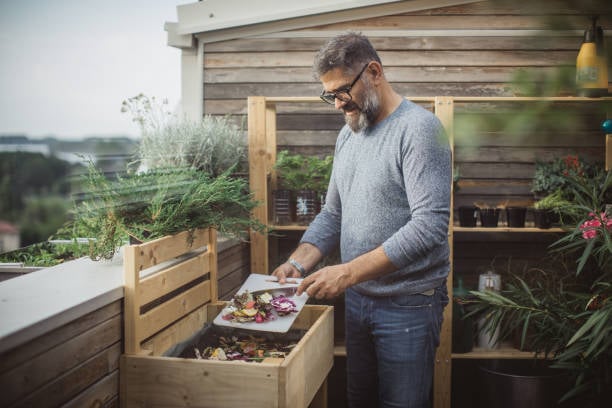
Building Your Own Worm Bin
Make your worm bin with your home materials to save money! All you have to do is gather your tools and materials and follow our step-by-step instructions to create your DIY worm bin, ensuring it’s an indoor setup.
Composting Indoors
If you want to start worm composting at home and want to start small, Uncle Jim recommends indoor composting. You will be able to control the temperature better and other environmental factors that can make or break how well your worm compost project does.
Apartment Composting
Composting in an apartment versus a house is a very different experience. Uncle Jim understands your predicament, and our team has created a guide on adjusting traditional vermicomposting practices so they work in an apartment setting!
Vermiculture for Gardeners
Starting your worm farm could benefit people with a green thumb and enjoy gardening. Continue reading to learn how live worms can help your garden grow and bloom.
How to Harvest Worm Castings
Now that you have built your worm bins and given the worms time to do their thing, it is time to collect that precious finished compost. However, you wonder, “How do I do that?”. Allow Uncle Jim to walk you through the various steps and processes you can take to ensure you reap the rewards of your hardworking worms.
Making Worm Tea at Home
The vermicomposting process yields yet another practical byproduct: worm tea. It is easy to make and provides numerous nutritional benefits to the soil. Learn the secret in our blog post!!
Vermicomposting as a Business

Starting a Worm Farm
If you are interested in the nitty-gritty details of vermicomposting, starting a worm farm to sell worms or their worm castings is a great and fun business idea. Uncle Jim will advise you on which worms are best for what, the best food for each worm type, and other information you will need to start a successful vermiculture business, including handling a variety of composting worm populations and worm populations.
The Best Worms for You
When it comes to vermicomposting, most people believe that all worms are the same, but red wigglers and nightcrawlers reign supreme. As you start your vermiculture business, let us take a deep dive into the best worms for specific uses.
How Vermicomposting Helps Your Business
The benefits of vermicomposting can be scaled and applied to a larger scale for businesses. Continue reading to learn how it will translate to cost savings and faster processes, reducing waste materials and maximizing the quantity of waste material.
What Worm Bin System Works for Businesses
Scaling up the vermicomposting process will involve significantly bigger bins and more complex systems than those used for home vermicomposting. Let us dive deep into which method best suits your business needs, ensuring a healthy worm population and a friendly environment.
Taking Care of Your Worms

(Source: pinterest)
Troubleshooting the Worm Bin
The worm bin must be in good condition so worms can reproduce and provide vermicomposters with worm castings. Uncle Jim explains how to fix common vermicomposting problems, including maintaining a wet environment.
Worm Food – All That You Need to Know
Vermicomposting is a great way to reduce food waste, but you cannot just throw everything in. Worms, like humans, thrive on organic food, and some types can be harmful. This guide explains how to feed worms, emphasizing balanced conditions and carbon-rich materials.
Worm Reproduction: How it Works
Worms are hermaphrodites, meaning they have both male and female reproductive organs, and their reproductive process is very different from that of humans. Read our blog post to learn how they do it and how you can help make the process easier and faster for your worms.
How to Deal with Worm Bin Critters
Worms are not the only creatures competing for the worm bin’s food and nutrients. Some pests, like weeds, will steal everything your worms need to grow and reproduce. Learn about these critters and how to deal with them, ensuring a moist environment for your worms.
Regardless of what you do with your worms, Uncle Jim will provide the most essential ingredient: knowledge! I show you how to make these critters happy, healthy, and multiply. I don’t sell you worms and then say, “Bye-bye.” I’m here to help you with the entire process!
